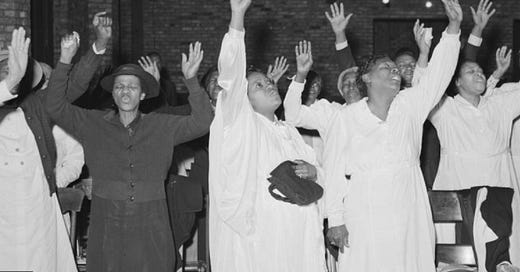Imagine, if you will, a church sanctuary where white Christians sit on one side, and Black Christians sit on the other. The groups can see each other across the aisle, but they rarely interact.
After watching Henry Louis Gates Jr.s’ “The Black Church” on PBS, I am having a hard time seeing U.S. Protestant Christianity — especially evangelicalism — any other way.
In a 1960 appearance on “Meet the Press,” the Rev. Martin Luther King Jr., called 11 a.m. Sunday “one of the most segregated hours if not the most segregated hour in Christian America.”
Of course, a large part of that is a reflection of our segregated neighborhoods. But if we can come together any where, why not in our practice of religion?
From “The Black Church:” Roughly 30% of Black Americans who came here in the holds of slave ships came as Muslims, but then they were converted to a docile brand of Christianity (light on Moses, heavy on redacted scriptures) by slave owners. Some of the people who lived in slavery held onto some Islamic practices, particularly those surrounding major life events. But however they adapted Christianity to their own beliefs, they rather quickly connected their new religion to social justice — and freedom.
We sang the same songs as our Black brothers and sisters. We certainly read the same scriptures, though you couldn’t have gotten my old church up for a ring shout if you’d tipped the building on its side. We didn’t even sway when we sang for fear someone would think we were dancing.
But we, too, studied the radical Jesus who welcomed into the fold people who’d never been welcomed before. We studied the Jesus who tossed a table when capitalists took over the temple. We read about Moses and understood the significance of the Israelites escaping Pharaoh’s bondage. Yet so often it is still the Black church at the forefront of social movements, connecting their religion to freedom.
And the white church? Obviously there are white churches — and white Christians — pushing for social justice, but think about the role white Christianity played in the Jan. 6th armed insurrection. And think about the role so many white Christian leaders take upon themselves as prophets who can only see the past. Read Franklin Graham’s statement from last August:
“I’m just asking that God would spare this country for another four years to give us a little bit more time to do the work before the storm hits. I believe the storm is coming. You’re going to see Christians attacked; you’re going to see churches close; you’re going to see a real hatred expressed toward people of faith. That’s coming.”
Ah, Franklin. I hope your posturing is worth it.
By way of finding common ground, “evangelical” is a big umbrella, but historian David Bebbington defines core evangelical beliefs thus:
Conversionism, or the belief that lives need to be transformed through a born-again experience and then followed by a life-long process of following Jesus
Biblicism, or a high regard for and obedience to the Bible as the ultimate authority
Crucicentrism, or a stress on the sacrifice of Jesus on the cross that made possible the redemption of humanity, and then:
Activism, or the expression and demonstration of the gospel in missionary and social reform efforts
Yeah. That last one gets lost on the white side of the church. Pity. Imagine if we sat on the same side, and shared a common goal. It would be so much easier if we tossed tables together.





“The storm is coming, Christians attacked, real hatred expressed.”
That’s it? Q-speak and straw man arguments? I’m sorry to disappoint Franklin but I have other stuff to do.